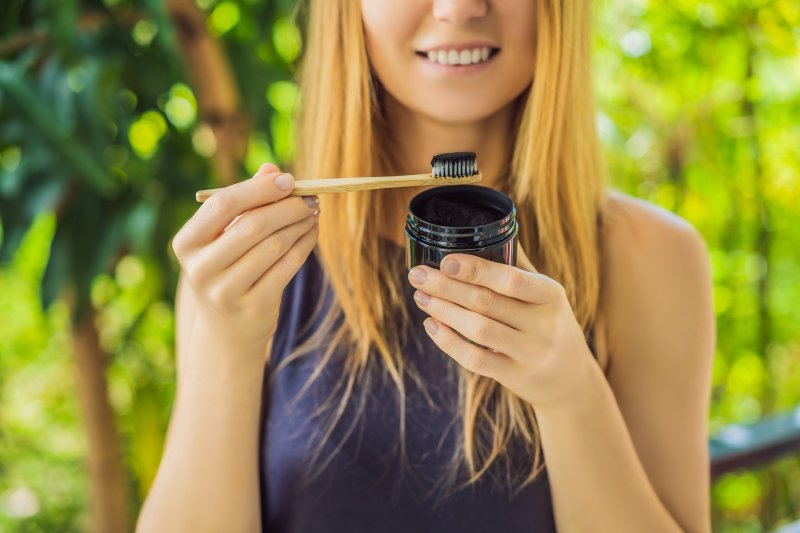
You’ve probably heard of activated charcoal if you’re considering DIY teeth whitening. On social media and elsewhere, the material is hyped as a miracle whitener that can give you instant results with low cost and effort. But Internet forums and word-of-mouth aren’t exactly reliable, fact-checked sources. Should you trust what you’re hearing and get in on this trend?
As it turns out, claims of charcoal’s whitening effects are greatly exaggerated. See for yourself in this summary on activated charcoal — its traits, risks, and why to get professional whitening instead.
Activated Charcoal Traits
Activated charcoal is a fine black powder made from stuff like coconut shells, sawdust, olive pits, peat, etc. When placed under extreme heat, it becomes porous and absorbent, taking in surrounding materials.
Why Would Charcoal Whiten Teeth?
The most famous trait of activated charcoal is its ability to absorb dirt and similar impurities. In centuries past, this made it useful for smelting bronze. Today, its absorbing power is used for shampoos, water filtration systems, and the treatment of poisons.
These and similar facts convince some that activated charcoal is the ideal DIY whitener. Just as it absorbs other materials, it would absorb stains and plaque from enamel surfaces. All you’d have to do for a whiter smile is apply it directly or use charcoal-based toothpaste.
Charcoal Whiteners Are Harmful
You’re more likely to harm your teeth with activated charcoal than help them. The ADA has said activated charcoal’s texture thins your enamel, which can lead to increased tooth sensitivity. Plus, exposing your dentin — the inner layers of your teeth — risks other conditions like cavities or bacterial infections.
Charcoal Whiteners Are Ineffective
There’s also little reason to believe the charcoal would whiten your teeth anyway. The tooth damage mentioned above will leave your smile looking dirty, blackened, and weak. For that reason, charcoal items don’t receive the American Dental Association’s (ADA) Seal of Acceptance. In other words, neither pure activated charcoal nor products made from it will have any whitening effect.
See a Dentist for Professional Whitening
Dentists agree that professional whitening works better than activated charcoal. They vet the former for both safety and effectiveness. For instance, many cosmetic dentists can bleach your teeth with hydrogen peroxide to remove teeth stains for a whiter, healthier smile. Some even offer customized bleaching trays that patients can take home for personal use.
Don’t assume that charcoal will get you the whitened teeth you’ve always wanted. Instead, remember the risks and consider seeing your dentist for a healthy, shining smile.
About the Author
Dr. Cher Rich is a dentist practicing in Houston, TX. She earned her Bachelor of Science degree from Texas A&M and her DDS from the University of Texas at Houston’s Dental School. So that her patients can achieve and maintain healthy smiles, she specializes in preventive, restorative, and cosmetic dentistry. Dr. Rich is also equipped to perform periodontal, TMD, and sleep apnea therapies. She currently practices at her self-titled clinic and can be reached by phone at (281)-469-6281.
